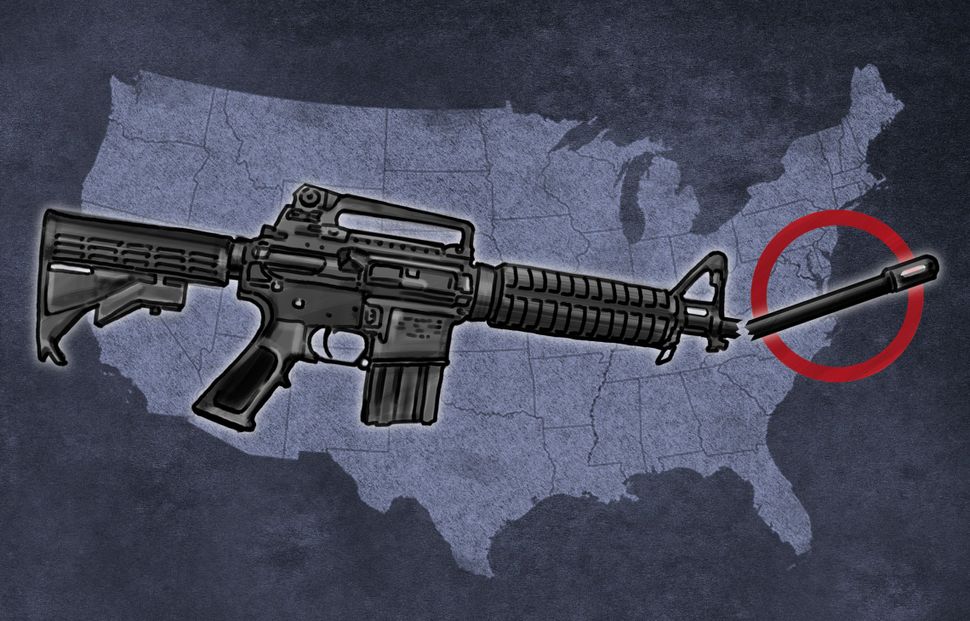Gun Violence is Written into the Fabric of Our Country

Image by Nikki Casey
This piece is the fourth in a series of reflections on mass violence from members of Sixth & I synagogue in Washington, DC.
A year ago, when my husband and I discovered that I was pregnant, we, like most expectant new parents, were overjoyed. The icing on our baby cake was the anticipation that our child, son to a white father and black mother, would be a little mocha-colored baby. When he was born in April, we were surprised that he popped out slightly paler than his dad. Of course, this did nothing to diminish our delight in finally meeting the baby that had occupied our thoughts and dreams for the nine previous months.
During my pregnancy and maternity leave, I tried to avoid the news as much as possible. Not only did I want to experience only positive thoughts while gestating my son, but I was also exhausted from the physical and mental demands of pregnancy and new motherhood. Who needs an incessant parade of negativity while navigating the most precarious and challenging portions of adulthood?
However, living as I do in Washington DC, awareness of current events seeps in whether bidden or not, and so I could not escape the torrent of horrible, violent news from around the country.
The emotionally unsatisfactory conclusion of the Freddie Gray trials.
Charles Kinsey shot in Miami while protecting his Autistic patient.
Alton Sterling and Philando Castile, shot for no sensible reason.
Police officers hunted for undeserved revenge in Dallas.
Upon hearing of these racially-inflected police incidents and more, I find myself increasingly, secretly, shamefully pleased that my biracial son is light enough to “pass.” In a misguided bit of ostrich-like behavior, I fantasize that his skin tone will be enough to keep authoritarian violence at bay until his true character and intentions can be made known. But deep down, I know that his skin won’t and couldn’t possibly protect him from the general viciousness of a society infused with and built on a toxic mix of racial inequality, state-sanctioned brutality, and easy, almost universal, access to guns.
This assignment was to write about the moment when gun violence first hit home for me. There isn’t a single moment. There’s only been a slow, creeping realization that it’s no accident that we are in our current situation. These seeds were planted when the Colonies built economic success on the backs of forcibly imported African slaves. They were watered when Thomas Jefferson wrote, “All men are created equal” in our country’s founding document, yet convinced the Southern colonies to join the new union by allowing them to keep their slave laborers. They have thrived on the constant nourishment of the 2nd amendment, which by giving “the people” a right to “keep and bear arms,” unintentionally legitimizes personal violence in the name of security. The Constitution, which every politician likes to trot out to demonstrate that they know America, is written proof that our country was founded on explicit racial inequality, the implicit lie of racial and economic parity, and the promise of the right to inflict gun violence on those whom you perceive as a threat. And we have the gall to wonder why mass shootings, police shootings, school and campus shootings, domestic violence shootings, gang shootings, and gun suicides are so prevalent.
This is the point in my essay when I’m supposed to shift in tone from demoralized to hopeful. I can’t do that. Following the [Orlando] attack, “Daily Show” host Trevor Noah said on air: “The president — he made a powerful point. America has to decide if this is the kind of country that it wants to be. Every time this happens, it feels like America has already decided, this is exactly the kind of country it wants to be.” These are powerful words, but I wonder if our forefathers ever gave us a choice in the matter. Until we decide to examine our history and see it for what it really is, and how damaging it continues to be, I seriously doubt we will ever find a solution to the problem of guns in America. We will certainly never find a solution to the problem of race in America until we all (but let’s be real; mostly White people) can honestly face and take responsibility for the multitude of horrors upon which America was built.
For our part, my husband and I will continue to do what all new parents do; we will delight in our little boy’s first words and first steps. But we will also do what most parents do not have to do – we will teach our son what it means to be black and white, his mixed-race heritage embodying both America at its inclusive best and at its divisive worst. I want him to understand how America was really made. Maybe then, I can begin to hope that he, and others like him, will use that understanding to re-make America.
























